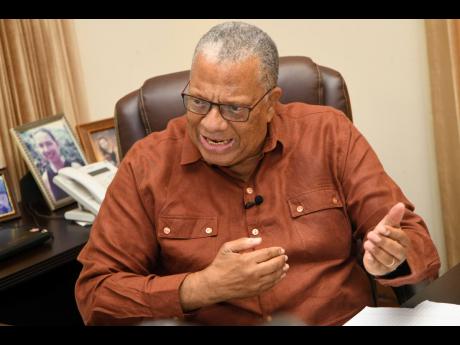Phillips to keep ZOSOs, kick SOEs if PNP takes power
The states of emergency (SOEs) imposed across half the island as part of a push by the Government to reduce Jamaica’s ballooning murder rate will not be extended if the People’s National Party (PNP), under the leadership of Dr Peter Phillips, takes over state power after the next general election.
The zones of special operations (ZOSOs), a security measure developed and implemented by the Holness administration, would, however, remain in place under a PNP administration.
“The states of emergency go. They are not crime-fighting measures. We are intent on providing a crime plan and we have highlighted all the elements that need to be there,” declared Phillips.
“We have said that the states of emergency provisions in our Constitution and in our laws were never intended as a long-term crime fighting measure,” he added during a wide-ranging interview with The Gleaner last week.
ZOSO could be useful
However, Phillips, the PNP president, acknowledged that the ZOSO legislation, which provides a mixture of hard policing and social intervention strategies, could be useful in tackling the crime problem.
“There is scope for the ZOSO legislation to be used. There is also scope to look at some of the other provisions in law,” he said.
“I have said on more than one occasion that we need to recognise that modern policing is all intelligence-led policing … that we need to build up our capacity.”
A general election is constitutionally due early next year, but is been widely expected to be called later this year. However, the ongoing novel coronavirus outbreak factor into the timeline.
In 2017, Jamaica recorded a total of 1,616 murders, including 342 in the parish of St James. To help stop the bloodletting, an SOE was imposed in St James in January 2018 by the Holness administration.
At the end of 2018, murders nationally were slashed to 1,287, including 102 in St James, but the security measure, which curtails the rights of citizens, came to a screeching halfway into January last year after the parliamentary Opposition, led by Phillips, voted against an extension.
Amid an upswing in murders across the island, including a slew of brazen daylight killings, an SOE was again imposed in St James, along with Hanover and Westmoreland, in April last year. Since then, SOEs were also imposed in St Catherine and Clarendon, as well as the St Andrew South and Kingston East police divisions.
Despite the SOEs, Jamaica recorded a marginal increase in murders last year when 1,326 persons were killed. A total of 256 murders were recorded between January 1 and March 7 this year, a 4.5 per cent increase over the comparative period last year.
SOEs have been imposed in eight of the 19 police divisions. Three SOE areas have seen an uptick in murder year-on-year, but most serious and violent crimes have plunged. However, 256 people were slain up to March 7 - 11 more than for the corresponding period last year.
SOE ‘not working’
Holness, the prime minister, and members of his Cabinet have insisted that the SOEs are working, but Phillips doubled down on his claim that they have failed and his criticisms of the way the crackdown has been utilised.
“It [SOE] has become a symbolism to substitute for an action plan to fight crime. The fact that they have had it and extended it all over, but at the same time islandwide, murders continue to rise … . There is a clear sense that it is not working.”
The PNP president, who is also a former minister of national security, insisted, too, that the operations being conducted by the security forces as part of the SOEs are not being guided by “effective intelligence.”
“The absence of effective intelligence is seen in the fact that even when the SOEs are declared, there are very few detention orders and the bulk of the detainees are people arbitrarily arrested by the police,” he charged.
“If you look at it, a lot of the violence producers continue to operate beneath the radar, so to speak, because there are no detention orders being issued for them, all of which reflect the flaws from intelligence-gathering.”

